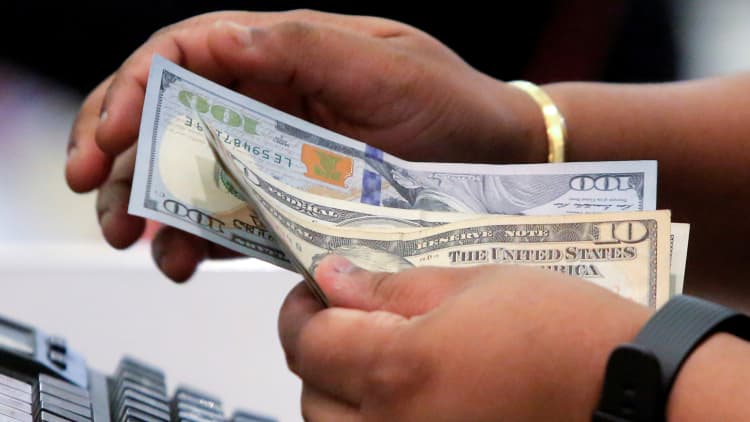
Americans now owe a collective $1.13 trillion on their credit cards, according to a new report on household debt from the Federal Reserve Bank of New York.
Credit card balances increased by $50 billion, or roughly 5%, in the fourth quarter of 2023, the New York Fed found. Credit card delinquency rates also jumped — particularly among younger millennials, or borrowers between the ages of 30 and 39, who are burdened by high levels of student loan debt.
"This signals increased financial stress, especially among younger and lower-income households," said Wilbert van der Klaauw, economic research advisor at the New York Fed.
Why so many Americans are under pressure
"Even though the economy overall is doing great, there are pockets out there where people are overextended," the New York Fed researchers said on a press call Tuesday.
Many consumers feel strained by higher prices — most notably for food, gas and housing — and more cardholders are carrying debt from month to month or falling behind on payments, according to a separate report from the Consumer Financial Protection Bureau.
More from Personal Finance:
Gen Z, millennials want to invest — but many aren't
Americans can't pay an unexpected $1,000 expense
Why workers' raises are smaller in 2024
Nearly one-tenth of credit card users find themselves in "persistent debt" where they are charged more in interest and fees each year than they pay toward the principal — a pattern that is increasingly difficult to break, the consumer watchdog said.
Credit card rates top 20%
Credit card rates were already high but spiked along with the Federal Reserve's string of 11 rate hikes, including four in 2023.
Since most credit cards have a variable rate, there's a direct connection to the Fed's benchmark. As the federal funds rate rose, the prime rate did, as well, and credit card rates followed suit.
The average annual percentage rate is now more than 20% — also an all-time high.
Why credit card debt keeps rising
"Even though $1 trillion in credit card debt is a staggering number to wrap your brain around, the unfortunate truth is that it is only going to keep climbing from here," said Matt Schulz, chief credit analyst at LendingTree.
"Americans are still struggling with lingering inflation and rising interest rates," he added, "forcing them to lean on credit cards more and more."
Despite the steep cost, consumers often turn to credit cards, in part because they are more accessible than other types of loans, Schulz said. However, that comes at the expense of other long-term financial goals, he added.
Until recently, most Americans benefited from a few government-supplied safety nets, including the large injection of stimulus money during the pandemic, which left many households sitting on a stockpile of cash that enabled some cardholders to keep their credit card balances in check.
But that cash reserve is largely gone after consumers gradually spent down their excess savings from the Covid-19 years.
What to do if you're in credit card debt
If you're carrying a balance, try calling your card issuer to ask for a lower rate. Or you might consolidate and pay off high-interest credit cards with a lower interest home equity loan or personal loan, or switch to an interest-free balance transfer credit card, Schulz advised.
To optimize the benefits of their credit card, consumers should regularly compare credit card offers, pay as much of their balance as they can as soon as they can and avoid paying their bill late, according to Mike Townsend, a spokesperson for the American Bankers Association.
"Any credit card holder who finds themselves in financial stress should always contact their card issuer to make them aware of their situation," Townsend said. "They may be eligible for some relief or assistance depending on their individual circumstances."


